Term Page
Post-Conviction Relief 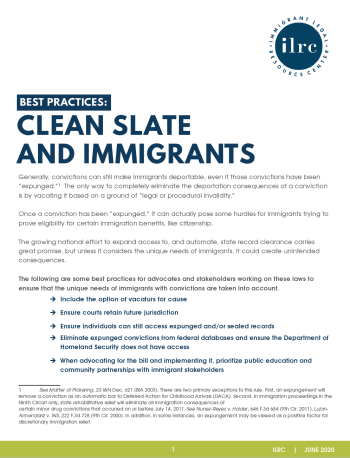
This resource outlines some best practices for advocates and stakeholders working to expand access to, and automate, state record clearance.
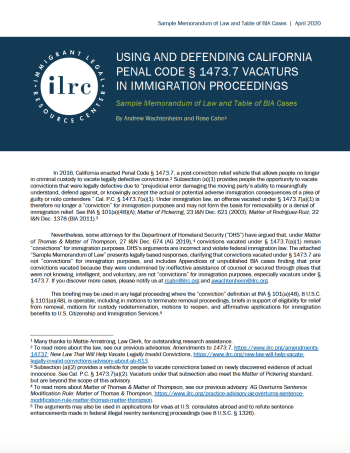
In 2016, California passed California Penal Code § 1473.7, a critical post-conviction relief vehicle for people no longer in criminal custody to move to eliminate prior convictions that violated constitutional and statutory rights to due process and effective assistance of counsel. Under decades of legal precedent, prior offenses vacated on this basis are outside the federal immigration definition of "conviction." Nevertheless, some DHS attorneys incorrectly argue that § 1473.7 vacaturs are not effective for immigration purposes. This practice advisory, a Sample Memorandum of Law and Table of BIA Cases, presents arguments and precedent for refuting DHS's arguments.
California law requires prosecutors to consider immigration consequences when plea bargaining. Cal. Pen. C. 1016.3(b). This memo describes the unique duties prosecutors have when charging and negotiating DUI-related cases with DACA recipients.
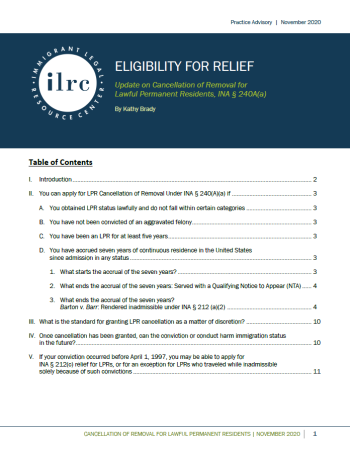
Cancellation of removal under INA § 240A(a) is an important defense for lawful permanent residents who have become removable, due to criminal record or other reasons. The requirements for statutory eligibility are complex, and it is critical for advocates to understand the risks and strategies that arise from the Supreme Court’s decision on the “stop-time” rule, Barton v. Barr, --U.S.--, 140 S.Ct. 1442 (2020). This Advisory is an updated step-by-step guide to eligibility, potential arguments, and defense strategies for LPR cancellation.

On October 25, 2019, Attorney General Barr issued a precedential opinion limiting when immigration authorities will give effect to a state court modification of an imposed sentence. See Matter of Thomas and Matter of Thompson, 27 I&N Dec. 674 (AG 2019), available at: https://www.justice.gov/eoir/page/file/1213201/download (“Matter of Thomas/Thompson”) While advocates plan to challenge this decision in the courts of appeals, it is now binding law. This advisory summarizes the case, provides advice to defenders, post-conviction practitioners, and immigrant advocates about its implementation, and suggests arguments to raise on appeal.
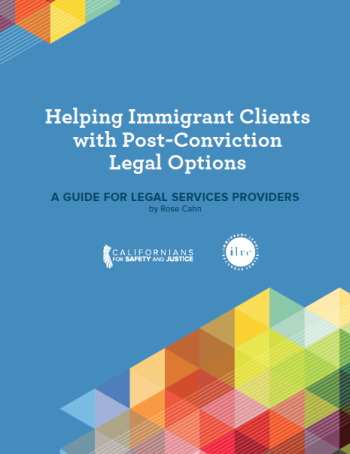
For noncitizens, even a low level offense like a shoplifting conviction can lead to mandatory deportation. However, this can be avoided when people secure post-conviction relief to erase or modify their old convictions. If the convictions are vacated, or the sentences reduced, the grounds for removal often evaporate.
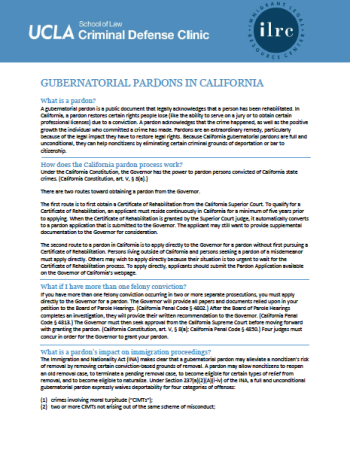
Gubernatorial pardons have become an increasingly important and accessible tool for immigrants to erase certain immigration consequences of criminal convictions. This two-page primer, written in collaboration with the UCLA School of Law Criminal Defense Clinic and available in both English and Spanish, provides an overview of the California Pardon process for potential applicants and their advocates.
Over the past four years, working with partner organizations throughout California and nationally, the ILRC has helped advocate and pass a series of reforms at the local and state levels that advance the rights of both citizens and noncitizens and connect the dots between the criminal and immigrant justice movements. This graphic describes some of these campaigns. If you would like support leading similar policy efforts of your own, please feel free to reach out to Rose Cahn, rcahn@ilrc.org.
In August 2018, the Board of Immigration Appeals issued a call for amicus briefs to respond to the question of whether an ILRC-sponsored law, California Penal Code 1203.43, effectively vacated convictions for the purposes of federal law. With gratitude for the assistance of Prof. Jennifer Lee Koh, Western State College of Law, and Michael Mehr, the ILRC coordinated 37 other legal services organizations, nonprofits, public defender offices, law school clinics, and law firms, to sign onto an amicus contending that the Board of Immigration Appeals should not treat convictions vacated under Penal Code 1203.43 as convictions for federal immigration purposes.
The BIA has held that that it will not give retroactive effect to California Penal Code § 18.5(a) on convictions from before January 1, 2015. It will consider a California misdemeanor conviction from before January 1, 2015 to have a potential sentence of up to one year, while a misdemeanor conviction on or after that date will have a potential sentence of up to 364 days. Having a potential sentence of just 364 days can help some immigrants who are convicted of a crime involving moral turpitude. (Note that this decision does not affect how immigration treats a sentence that actually was imposed. It only concerns the maximum possible sentence.) Advocates will appeal this decision.